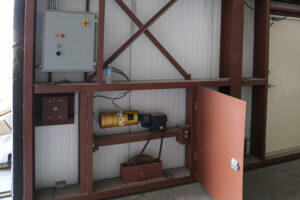
Rubber Tire Operators vs. Steel Wheel Operators, not an age-old question.
The questions seem to come up with many people, “why would we want to use a rubber tire operator?”, “why do you sell them?”, and the most often, “what works best?” First let’s start with, “what are you trying to accomplish?” The goal is to move the door without the aid of a tow tractor or by pushing it manually. This is the most common reason and frankly, we cannot think of another reason to have a motorized operation for a hangar door. There are several renditions, or variations of electric operators and most function by the use of an electric squirrel cage motor, gear reduction, and chain to drive a wheel. The main difference is that the wheel is either steel or rubber. Both accomplish the same task and both are tried and true. However, to answer the question, “which is better for MY hangar door?” we have to look at all of the factors for your specific project at hand.
So we approach the question from many angles, the one I ask a lot is, “why does the military specify steel wheel?” The answer is simple, the military is not quick to change any of the specification in the design guides they publish. In general military personnel are trained to not ask questions or question their superiors. This has created the use of other products to be shelved. Well Bilt has the rubber tire friction drive units in military facilities in hopes to get the attention of the specifying personnel to look at the product, however, we have found that there is still a hard sell when it comes to specifying the operator, as change does not come easy. To illustrate this better, the NAVFAC, or Naval Facilities Engineering Command still specifies paints and finish products that are no longer in production and some that contain lead.
Why don’t other manufactures have the hangar door operator? Well, the truth is they do. Norco Universal Door Systems sells a Door Wheeler that has many of the same attributes as the Hercul-Eze® Hangar Door Operator. The main difference is Norco does not have an “In the Door” solution to the operator. So they try and get the sale up front. Door Engineering and AeroDoor are trying to offer products to compete, however, the robust engineering and quality of construction makes it hard for the competitors to produce a product as good as the Hercul-Eze® Hangar Door Operator. When it comes to having a superior product with years of tried and true operation, nothing compares to the Hercul-Eze® and its outstanding warranty.
- Hercul-Eze® solid rubber tires create more friction; this traction allows the door to run more efficiently in wet or slippery conditions.
- Rubber Tires require less door mass than the steel wheel caster driven systems. Steel wheels commonly have ballast added to the frame of the drive wheel to create pressure against the rail using gravity. This weight makes the door more difficult to move when power is out due to extreme weight added.
- Well Bilt Industries builds the only patented system that contains a quick release to retract the tire from the surface. This system also allows the user to increase the pressure of the operator in retrofit situations.
- The quick release also allows the door to be pushed manually by releasing the tension on the door.
- Solid rubber tires are the wearing surface rather than the steel wheel. For those who have not had to change out a drive caster, you may not be able to appreciate the cost as well as the difficulty in the work. With the rubber tire taking on the traction duties the steel wheels last longer and are much easier to change when needed. Rubber friction tires are inexpensive and can be replaced in minutes, rather than hours, at a low cost!
- Steel wheel systems require back drivable gear reduction systems. These systems do not move easily when the power is out or the motors become worn out. These gears also tend to wear quicker.
- For each of our rubber tire operators we use a 36-tooth sprocket. The tooth count of a steel wheel operator is 24. Due to the smaller diameter of the steel wheel operator sprockets the speed of the door system is reduced.
- Steel wheel operators are mounted in the availible annular space of the channel and our rubber tire wheel operator, the Hercul-Eze® Hangar Door Operator, is also mounted in the same annular space.
- The last benefit is the Hercul-Eze® Hangar Door Operator’s rubber tire wheel can be removed in minutes, replaced, serviced etc.
- Unlike other rubber tire systems, the Well Bilt Hercul-Eze® uses a solid tire vs. pneumatic. This ensures constant traction and zero maintenance, unlike our competitors.
- Steel wheel operators do not depend upon the concrete to be within a 1/8” so for the slab that is poorly finished we suggest a steel wheel.
- Steel wheel operators have more slippage when stopping if the combination of a motor break is used.
- Hercul-Eze® can be removed and taken with you to your next hangar if you decide to move. Therefore allowing you to keep your investment for future use, something that is not possible with a steel wheel operator.
The Well Bilt Hercul-Eze® Hangar Door Operators come in sizes ranging from the 200 to 500 series capable of operating 80,000 LBS with a single drive unit.
HERCULEZE Hangar Door Operators have been around a decades. Well Bilt pioneered the “In the Door” operator and patented the system. Over the years the Well Bilt Operator has taken on new looks as well as updated controls, however, the robust design has made this operator last for generations.
